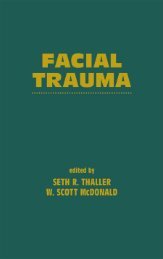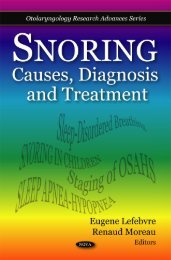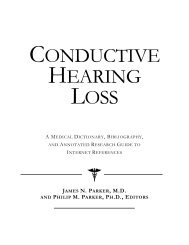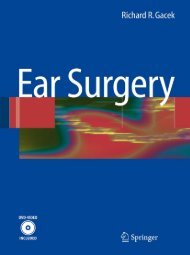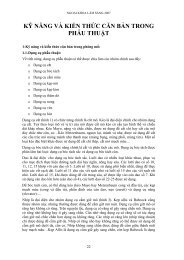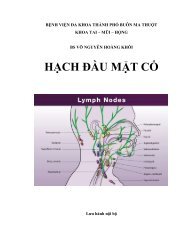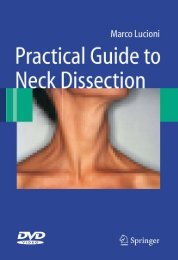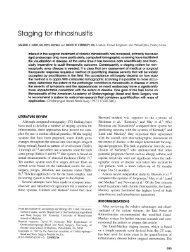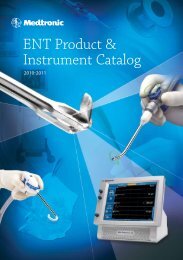Familial Nasopharyngeal Carcinoma 6
Familial Nasopharyngeal Carcinoma 6
Familial Nasopharyngeal Carcinoma 6
- No tags were found...
You also want an ePaper? Increase the reach of your titles
YUMPU automatically turns print PDFs into web optimized ePapers that Google loves.
Drug Therapy for <strong>Nasopharyngeal</strong> <strong>Carcinoma</strong>: Cytotoxic and Targeted Therapy 15711.5ConclusionsSystemic chemotherapy has contributed significantlyto the improved clinical outcome of patients withadvanced NPC over the last two decades. The combineduse of neoadjuvant chemotherapy and concurrentchemoradiation, and the role of adjuvantchemotherapy following chemoradiation warrantfurther investigation in a phase III setting. Anincreasing number of cytotoxic agents have nowbeen shown to be active against NPC, and drugs targetingthe EGFR and angiogenesis are shown underphase I and II evaluation. The priorities now are toidentify predictive biomarkers for individualizingdrug therapy in advanced NPC, to evaluate moreeffective drugs for the eradication of micrometastasesfollowing chemoradiation, and also as maintenancetherapy after achieving best response withpalliative chemotherapy in advanced NPC.ReferencesAiroldi M, De Crescenzo A, Pedani F, et al (2001) Feasibilityand long-term results of autologous PBSC transplantationin recurrent undifferentiated nasopharyngeal carcinoma.Head Neck 23:799–803Airoldi M, Pedani F, Marchionatti S, et al (2002) Carboplatin plustaxol is an effective third-line regimen in recurrent undifferentiatednasopharyngeal carcinoma. Tumori 88:273–276Al-Kourainy K, Crissman J, Ensley J, et al (1988) Excellentresponse to cis-platinum-based chemotherapy in patientswith recurrent or previously untreated advanced nasopharyngealcarcinoma. Am J Clin Oncol 11:427–430Al-Sarraf M, LeBlanc M, Giri PG, et al (1998) Chemoradiotherapyversus radiotherapy in patients with advanced nasopharyngealcancer: phase III randomized Intergroup study0099. J Clin Oncol 16:1310–1317Ambinder RF, Robertson KD, Tao Q (1999) DNA methylationand the Epstein–Barr virus. Semin Cancer Biol 9: 369–375American Joint Committee on Cancer. Head and Neck sites (2002)Cancer staging handbook. Springer, New York, 50–52 *Au E, Ang PT (1994) A phase II trial of 5-fluorouracil and cisplatinumin recurrent or metastatic nasopharyngeal carcinoma.Ann Oncol 5:87–89Au E, Tan EH, Ang PT (1998) Activity of paclitaxel by threehourinfusion in Asian patients with metastatic undifferentiatednasopharyngeal cancer. Ann Oncol 9:327–329Azli N, Fandi A, Bachouchi M, et al (1995) Final report of aphase II study of chemotherapy with bleomycin, epirubicin,and cisplatin for locally advanced and metastatic/recurrent undifferentiated carcinoma of the nasopharyngealtype. Cancer J Sci Am 1:222Bachouchi M, Cvitkovic E, Azli N, et al (1990) High completeresponse in advanced nasopharyngeal carcinoma withbleomycin, epirubicin, and cisplatin before radiotherapy.J Natl Cancer Inst 82:616–620Baujat B, Audry H, Bourhis J, et al (2006) MAC-NPCCollaborative Group. Chemotherapy in locally advancednasopharyngeal carcinoma: an individual patient datameta-analysis of eight randomized trials and 1753 patients.Int J Radiat Oncol Biol Phys 64:47–56 *Boussen H, Cvitkovic E, Wendling JL, et al (1991) Chemotherapyof metastatic and/or recurrent undifferentiated nasopharyngealcarcinoma with cisplatin, bleomycin, and fluorouracil.J Clin Oncol 9:1675–1681Chan A, Tao Q, Keith D, et al (2004) Azacitidine induces demethylationof the Epstein–Barr virus genome in tumors.J Clin Oncol 22:1373–1381Chan AT, Hsu MM, Goh BC, et al (2005) Multicenter, phase IIstudy of cetuximab in combination with carboplatin inpatients with recurrent or metastatic nasopharyngeal carcinoma.J Clin Oncol 23:3568–3576Chan AT, Leung SF, Ngan RK, et al (2005) Overall survival afterconcurrent cisplatin-radiotherapy compared with radiotherapyalone in locoregionally advanced nasopharyngealcarcinoma. J Natl Cancer Inst 97:536–539Chan AT, Ma BB, Lo YM, et al (2004) Phase II study of neoadjuvantcarboplatin and paclitaxel followed by radiotherapyand concurrent cisplatin in patients with locoregionallyadvanced nasopharyngeal carcinoma: therapeutic monitoringwith plasma Epstein–Barr virus DNA. J Clin Oncol22:3053–3060Chan AT, Teo PM, Leung TW, et al (1995) A prospective randomizedstudy of chemotherapy adjunctive to definitiveradiotherapy in advanced nasopharyngeal carcinoma. IntJ Radiat Oncol Biol Phys 33:569–577Chan AT, Teo PM, Ngan RK, et al (2002) Concurrent chemotherapy-radiotherapycompared with radiotherapy alonein locoregionally advanced nasopharyngeal carcinoma:progression-free survival analysis of a phase III ranodmizedtrial. J Clin Oncol 20:2038–2044Chen CL, Sheen TS, Lou IU, et al (2001) Expression of multidrugresistance 1 and glutathione-S-transferase-Pi protein innasopharyngeal carcinoma. Hum Pathol 32:1240–1244Cheung HW, Jin DY, Ling MT, et al (2005) Mitotic arrest deficient2 expression induces chemosensitization to a DNAdamagingagent, cisplatin, in nasopharyngeal carcinomacells. Cancer Res 65:1450–1458Chi KH, Chang YC, Chan WK, et al (1997) A phase II study ofcarboplatin in nasopharyngeal carcinoma. Oncology 54:203–207Chi KH, Chang YC, Guo WY, et al (2002) A phase III study ofadjuvant chemotherapy in advanced nasopharyngeal carcinomapatients. Int J Radiat Oncol Biol Phys 52:1238–1244Chitapanarux I, Lorvidhaya V, Kamnerdsupaphon P, et al (2007)Chemoradiation comparing cisplatin versus carboplatin inlocally advanced nasopharyngeal cancer: randomised,non-inferiority, open trial. Eur J Cancer 43:1399–1406Chow LS, Wang X, Kwong DL, et al (2000) Effect of p16INK4aon chemosensitivity in nasopharyngeal carcinoma cells.Int J Oncol 17:135–140Chua D, Ma J, Sham J (2005) Long-term survival after cisplatin-basedinduction chemotherapy and radiotherapy for



